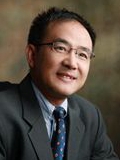|
|
Dr. Hu received his M.D. in 1997 at the Second Military Medical University, Shanghai, and had served there till 2001. He further earned his Ph.D. in 2004 at Institue of Biochemisty, Chinese Academy of Sciences, Shanghai. Afterwards, he finished his postdoctoral training in 2010 at Yale Cancer Center and Harvard Medical School. Currently, Dr. Hu is a Professor of Cancer Immunology at Institutes of Biomedical Sciences & Shanghai Cancer Center, Fudan University. The complement system is an important component in the arsenal of innate immunity and bridges innate to adaptive immunity. The versatile complement functions basically as an intricate immune surveillance system to clear cellular debris, apoptotic cells, immune complexes and foreign intruders, and further involves in such diverse processes such as synapse maturation, angiogenesis, tissue regeneration and lipid metabolism. To prevent the deleterious damage on autologous cells, over ten complement regulatory proteins have been evolved to inhibit complement activation at diverse stages. Therefore, complement is finely toned at a delicate balance between activation and regulation in normal condition. However, excessive or dysregulated complement activation can also turn its destructive capabilities against host cells, thus contributing to numerous diseases including cancer, immune, inflammatory, neurodegenerative, ischemic and age-related diseases. Using complement as a model system, the roles and mechanisms for complement in inflammation-induced malignant transformation, cancer therapy resistance, cancer metastasis, and cancer immunotherapy are investigated in Dr. Hu’s lab.
Research Focus: Focuses on defining the roles and mechanisms of complement system in tumor initiation, progression, metastasis, and therapy resistance accompanied by interests in development of complement agonist/antagonist for human diseases therapy.
|




